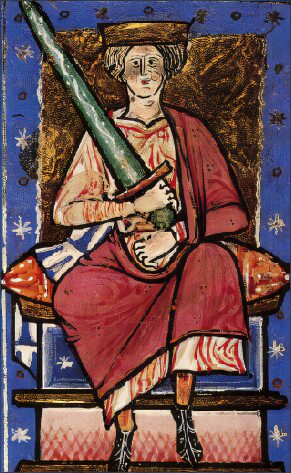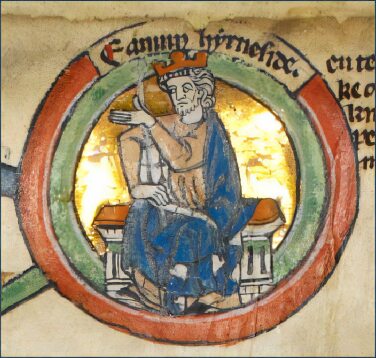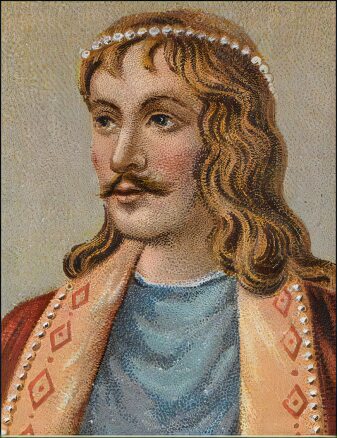Ealdorman of Mercia
Eadric Streona was an Ealdorman of Mercia, he was given the epithet "Streona", which is translated as "The Acquisitive" because he appropriated church land and funds for himself. Eadric became infamous due to his traitorous actions during the Viking re-conquest of England by King Canute.
Eadric came from a large family, being one of at least eight children and was of relatively humble origins. His father Ethelric attended the court of King Ethelred the Redeless, but possessed no titles. The family had interests in Shropshire and Herefordshire. Prior to becoming an ealdorman, Eadric seems to have acted as Ethelred's enforcer. In 1006 he instigated the killing of Ælfhelm, Ealdorman of York"-
Ethelred the Redeless
The crafty and treacherous Eadric Streona, plotting to deceive the noble Ealdorman Ælfhelm, prepared a great feast for him at Shrewsbury at which, when he came as a guest, Eadric greeted him as if he were an intimate friend. But on the third or fourth day of the feast, when an ambush had been prepared, he took him into the wood to hunt. When all were busy with the hunt, one Godwine Porthund (which means the town dog) a Shrewsbury butcher, whom Eadric had dazzled long before with great gifts and many promises so that he might perpetrate the crime, suddenly leapt out from the ambush, and execrably slew the ealdorman Ælfhelm. After a short space of time his sons, Wulfheah and Ufegeat, were blinded, at King Æthelred's command, at Cookham, where he himself was then staying.
Eadric was married to Ethelred's daughter Edith by 1009, thus becoming the king's son-in-law, he was appointed Ealdorman of Mercia in 1007. On St. Brice's Day, (18th November) 1002, King Ethelred foolishly ordered a great massacre of Danes throughout England in a single day and rivers of blood were shed. One of the victims of this outrage was Gunhilda, the sister of Sweyn, King of Denmark. Danish poetry recorded that Sweyn swore on the bragging cup to be avenged on the cowardly Ethelred.
Sweyn known as Tiugeskaeg, or Forkbeard due to his long, cleft beard, landed in England in 1013, intending to make himself King. . By the end of 1013, he had succeeded in conquering the country. Eadric is reported to have accompanied Æthelred's wife, Queen Emma, in crossing the channel to gain refuge in her native Normandy, they were followed by Æthelred in January 1014. However, the situation changed abruptly when Sweyn died suddenly of apoplexy, on 3rd February 1014, while threatening the Abbey of Bury St. Edmund's.
Edmund Ironside
Canute, the son of Sweyn, landed in England in August accompanied by an invasion force of about 200 ships. Eadric gathered an army at Cosham, where king Æthelred was ailing. The king's eldest son, Edmund Ironside, (right) joined with him. Eadric treacherously took forty ships from the Æthelred's fleet and fled to Canute. Around the New Year, Eadric accompanied Canute into Warwickshire, where they plundered, burned and slew all they encountered. Edmund assembled an army to resist them but his Mercian forces refused to fight the Danes and disbanded. Edmund went on to assemble a further army and, with the assistance of Uhtred the Bold Earl of Northumbria, plundered Eadric's lands in Staffordshire, Shropshire, and Cheshire. Uhtred then returned to Northumbria, where his lands were occupied by the Danes and he was obliged to submit to Canute. Uhtred was summoned to a meeting with Canute, he travelled to the rendezvous point at the hamlet of Wiheal on the southern boundary of Northumbria and following custom he and his men gave up their swords and axes. Uhtred the Bold and his men were then murdered by the Northumbrian magnate, Thurbrand the Hold, with assistance from Uhtred's servant, Wighill and with the connivance of Canute.
Æthelred breathed his last on 23 April in London at which Edmund was elected king of what remained of his father's kingdom, Edmund put up a heroic and valiant stand against the Viking invaders. The Danish army travelled south to London, Edmund left for Wessex, Eadric and Canute followed him, and two inconclusive battles were fought at Penselwood in Somerset and Sherston in Wiltshire, which lasted two days. The first day was bloody but inconclusive; on the second, Edmund had the upper hand but the traitor Eadric- cut off the head of a man named Osmear, whose face and hair was very like king Eadmund's, and, holding it up, cried out that it was useless for the English to fight, saying, "Oh! ye men of Dorsetshire, Devonshire and Wiltshire, flee quickly; ye have lost your leader: Lo! here I hold the head of your lord and king Eadmund: flee with all speed." When the English heard these words they were terror-struck - more by the atrocity of the act, than by Eadric's threatening words. " -John of Worcester, Chronicon ex Chronicis.
King Canute
Edmund's forces initially fled, but realising he still lived, fought on bravely until dusk. Eadric and Canute left the battlefield under cover of darkness and returned to London. Edmund then succeeded in rescuing London from the invaders, driving Eadric and Cnut out of the city and defeating them after crossing the Thames at Brentford; but he suffered heavy losses. He withdrew to Wessex to gather fresh troops, and the Danes again brought London under siege. But after another unsuccessful assault, they withdrew into Kent. After a final defeat at Otford, Eadric met Edmund at Aylesford and was accepted back into his favour.
On 18 October 1016, the Danes were engaged by Edmund's army as they retired towards their ships, leading to the Battle of Assandun, which was fought at either Ashingdon, in south-east, or Ashdon, in north-west Essex. In the ensuing struggle, Eadric, whose return to the English side may have been a ruse, withdrew his forces from the field of battle, as the Anglo-Saxon Chronicle records, he "betrayed his natural lord and all the people of England", resulting in a decisive Danish victory.
Edmund and Canute met on Ola's island near Deerhurst. Edmund invited Canute to fight him in single combat, in an attempt to limit the loss of life to decide the issue. The Danish King, arguing that Edmund's great size and strength made it an unfair competition, declined and suggested instead that they should partition the kingdom. An agreement was reached that England would be split in half at the Thames, Canute in the North and Edmund in the South. A treaty was drawn up, partitioning the country which would remain in force until the death of one of the participants to the treaty, at which time all lands would revert to the survivor. Only a month later, Edmund Ironside died in suspicious circumstances. According to one account, he was fatally wounded by an assassin in the employ of Edric Streona. Canute became the sole ruler of England.
Edric Streona was not to enjoy his new exalted position for long, considering himself to have not been amply rewarded by Canute, he quarrelled with the King. In a rage, Streona claimed that it was entirely due to his timely desertion of Edmund Ironside that Canute had acquired the throne. The wary Canute replied that a man who betrayed one master was likely to do the same to another. As Streona argued with the King, Eric of Northumbria stepped forward and struck him with his battle axe. His body was slung into the Thames and his head placed on a spike on London Bridge.
The chronicler William of Malmsbury recorded of Eadric Streona- "This fellow was the refuse of mankind, the reproach of the English; an abandoned glutton, a cunning miscreant; who had become opulent, not by nobility, but by specious language and impudence. This artful dissembler, capable of feigning anything, was accustomed, by pretended fidelity, to scent out the king's designs, that he might treacherously divulge them."
Aethelflaed, Lady of Mercia PreviousNext Edith of Wessex
